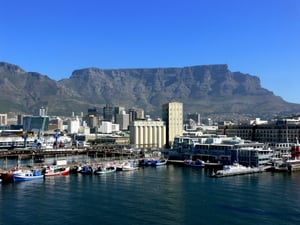
Water scarcity is looming over Cape Town, South Africa. A popular tourist destination and home to miles of eye-catching coastlines, this city is in the midst of a water crisis. Day Zero—the day the taps will officially run dry— steadily approaches.
It’s quite conceivable Cape Town will become the first major metropolis in the world to run out of water. The calculations on when the city will be left without water are updated every week, and the date was originally predicted to be April 29, 2018, but in January, Mayor Patricia De Lille was forced to move that date up. Now, the clocks are ticking down, and consumption habits aren’t changing fast enough to stop the impending outage.
In Cape Town, residents are currently restricted to approximately twenty three gallons per person per day. To meet the restrictions, most homes must limit showers to less than two minutes and refrain from flushing toilets until absolutely necessary. “According to city statistics, only 54% of residents are hitting their target,” reports Time Magazine, and “the city has few options for punishing individual water abusers and ensuring compliance.” Efforts to forestall Day Zero include recycling, drilling wells and building desalination facilities.
Construction of two desalination plants in Cape Town has been ongoing since early 2017, with their completion now delayed until February 2018. Desalination facilities remove salts and minerals from water to make it potable, and are expensive to operate. Cape Town must balance the grave reality of running out of water with the drastic and costly measures needed to prolong its availability.
The cost of water will no doubt continue to rise, impacting both the economy and social fabric of Cape Town. Tourism, which accounts for 9.4% of the country’s GDP, is likely to change with the rise of water scarcity awareness, and many hotels have already altered their standard accommodations. Steam rooms, pools and spas have been closed, and guests have even been incentivized for good water practices at some locations. Zara Nicholson, spokeswoman for Executive Mayor Patricia de Lille, wrote to the New York Times stating the city has no intention of curbing tourism, but highly encourages visitors to understand the situation and be responsible tourists. In a crisis like this, sustainability becomes imperative.
The Earth is covered in water, but only 3% of that water is freshwater, and the World Wildlife Foundation reports that “two-thirds of that is tucked away in frozen glaciers or otherwise unavailable for our use.” All efforts to reduce water consumption make a difference, and being reactive is not only costly, but at a certain point, no longer an option. The next months will no doubt put Cape Town in the spotlight, as countries, municipalities and the world watch how they fight to avoid Day Zero. Check out the New York Times article published in October of 2017 that started to raise global awareness about the Cape Town water crisis here:
Updated Feb. 2, 2018 to reflect changes in the Day Zero date, as it continues to be moved up
Photo of Cape Town waterfront by PxHere CC0
http://time.com/5103259/cape-town-water-crisis/
https://www.timeslive.co.za/news/south-africa/2017-10-17-ticking-water-time-bomb-tenders-for-desalination-plants-left-too-late/
https://www.worldwildlife.org/threats/water-scarcity





